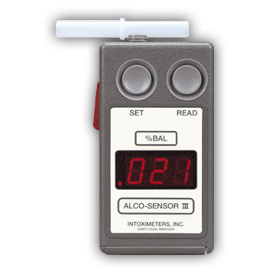Inaccurate Preliminary Breath Tests Lead to Improper Arrests
 A police officer will typically ask a driver to submit to a Preliminary Breath Test (PBT), a small hand-held breath testing device. Regardless of how a motorist performs on field sobriety tests, police officers rely upon the analysis of this machine because its objective. Problematically, however, PBT devices are known to be highly inaccurate, and the devices will occasionally produce very high readings that do not reflect a person's actual blood alcohol level. I once had a motorist arrested for a PBT result of .17 who provided a breath test on a Datamaster 20 minutes later. The result? It was a 0.02, significantly below the legal limit.
A police officer will typically ask a driver to submit to a Preliminary Breath Test (PBT), a small hand-held breath testing device. Regardless of how a motorist performs on field sobriety tests, police officers rely upon the analysis of this machine because its objective. Problematically, however, PBT devices are known to be highly inaccurate, and the devices will occasionally produce very high readings that do not reflect a person's actual blood alcohol level. I once had a motorist arrested for a PBT result of .17 who provided a breath test on a Datamaster 20 minutes later. The result? It was a 0.02, significantly below the legal limit.
Police officers are legally allowed to rely on the PBT results to determine whether "probable cause" exists to make an arrest because a Michigan statute expressly permits it. MCL 257.625a(2)(a) states that:
(a) A peace officer may arrest a person based in whole or in part upon the results of a preliminary chemical breath analysis.
(b) The results of a preliminary chemical breath analysis are admissible in a criminal prosecution for a crime enumerated in section 625c(1) or in an administrative hearing for 1 or more of the following purposes:
(i) To assist the court or hearing officer in determining a challenge to the validity of an arrest. This subparagraph does not limit the introduction of other competent evidence offered to establish the validity of an arrest.
(ii) As evidence of the defendant's breath alcohol content, if offered by the defendant to rebut testimony elicited on cross-examination of a defense witness that the defendant's breath alcohol content was higher at the time of the charged offense than when a chemical test was administered under subsection (6).
(iii) As evidence of the defendant's breath alcohol content, if offered by the prosecution to rebut testimony elicited on cross-examination of a prosecution witness that the defendant's breath alcohol content was lower at the time of the charged offense than when a chemical test was administered under subsection (6).
But police frequently fail to follow proper testing procedures. The failure to properly administer the PBT ensures inaccurate and unreliable results. Field sobriety tests and the PBT are employed by the police to determine whether a person should be arrested. While a motorist should politely refuse both the field sobriety tests and the PBT, they rarely realize this until after they have been arrested. Nevertheless, the officer's decision to arrest is subject to several attacks whenever the procedures deviate from established practice, protocols and procedures. Unfortunately, most attorneys are not knowledgeable enough in these areas to accurately assess the field sobriety tests and preliminary breath test results. The officer's decision to arrest is a critical stage of the case that must be properly analyzed.
Motion to Suppress the PBT
If I can establish that the PBT was improperly administered by the police officer, I can file a motion to suppress the PBT. Although this may not result in a dismissal of the case, the PBT is a major component in any Michigan DUI investigation. The more evidence that you can successfully challenge, the greater the likelihood is that the prosecutor will be willing to resolve the case in your favor. Likewise, if you are going to go to a jury trial, a successful attack on the PBT results in that evidence being excluded for all purposes before the jury.
Continue reading and go on to Improper Breath Testing Procedures